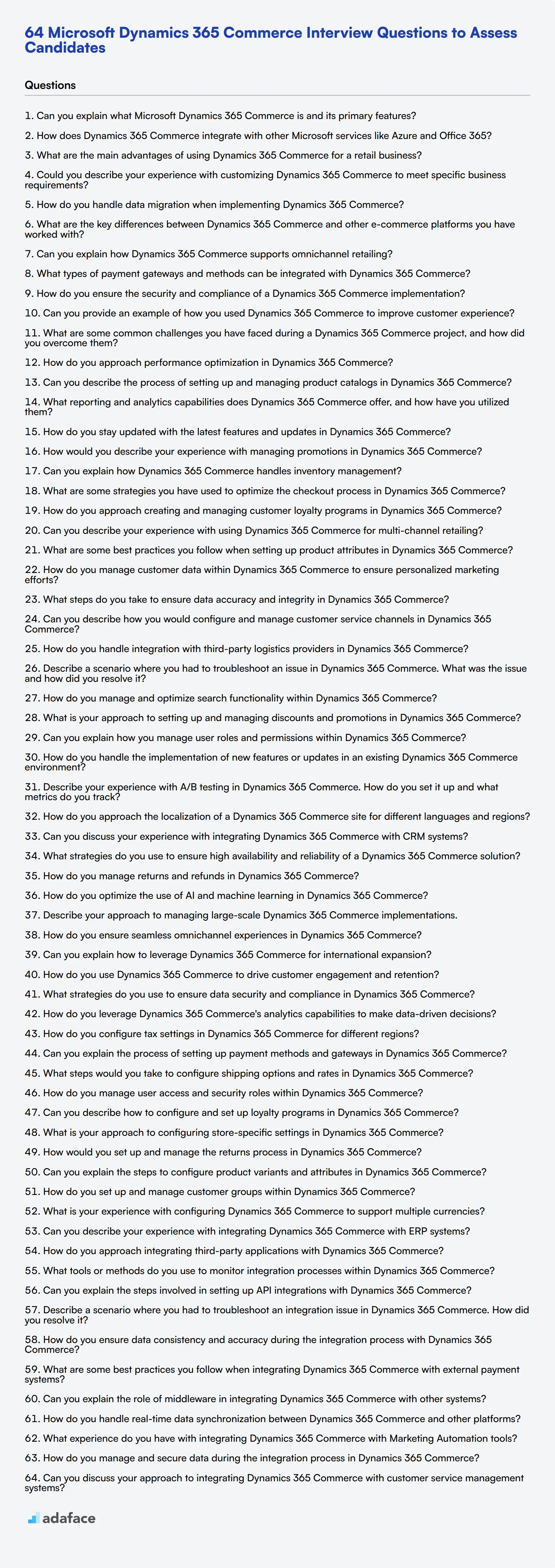Microsoft Dynamics 365 Commerce is a powerful tool, and finding the right talent to leverage it can significantly impact your business. Properly vetting candidates with the right questions can help you avoid costly hiring mistakes and ensure you bring on board professionals who can effectively utilize this technology.
This blog post provides a comprehensive list of interview questions tailored for various expertise levels, including basic, junior, intermediate, and senior positions. Additionally, we cover specific questions related to system configurations and integration processes in Microsoft Dynamics 365 Commerce.
Using this guide, you can streamline your interview process and find the best candidates suited to your needs. For a more efficient pre-interview evaluation, consider using the Microsoft Dynamics 365 Commerce Functional Consultant Test from our library.
Table of contents
15 basic Microsoft Dynamics 365 Commerce interview questions and answers to assess candidates
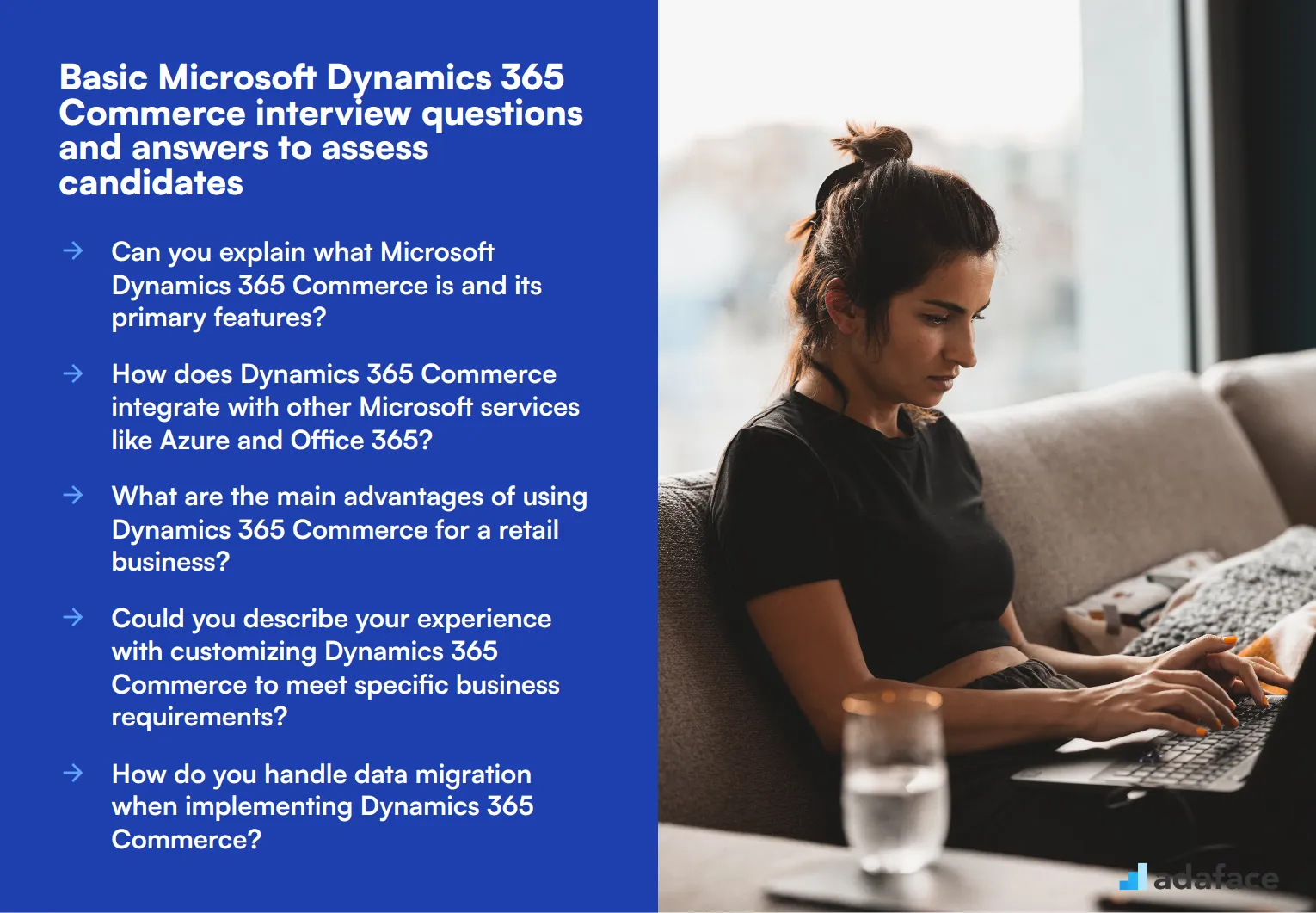
To assess whether candidates have a solid foundation in Microsoft Dynamics 365 Commerce, consider asking some of these key interview questions. They will help you gauge their understanding and practical knowledge, ensuring they are a good fit for the role. For more insights on hiring top talent, check out this business analyst job description.
- Can you explain what Microsoft Dynamics 365 Commerce is and its primary features?
- How does Dynamics 365 Commerce integrate with other Microsoft services like Azure and Office 365?
- What are the main advantages of using Dynamics 365 Commerce for a retail business?
- Could you describe your experience with customizing Dynamics 365 Commerce to meet specific business requirements?
- How do you handle data migration when implementing Dynamics 365 Commerce?
- What are the key differences between Dynamics 365 Commerce and other e-commerce platforms you have worked with?
- Can you explain how Dynamics 365 Commerce supports omnichannel retailing?
- What types of payment gateways and methods can be integrated with Dynamics 365 Commerce?
- How do you ensure the security and compliance of a Dynamics 365 Commerce implementation?
- Can you provide an example of how you used Dynamics 365 Commerce to improve customer experience?
- What are some common challenges you have faced during a Dynamics 365 Commerce project, and how did you overcome them?
- How do you approach performance optimization in Dynamics 365 Commerce?
- Can you describe the process of setting up and managing product catalogs in Dynamics 365 Commerce?
- What reporting and analytics capabilities does Dynamics 365 Commerce offer, and how have you utilized them?
- How do you stay updated with the latest features and updates in Dynamics 365 Commerce?
8 Microsoft Dynamics 365 Commerce interview questions and answers to evaluate junior specialists
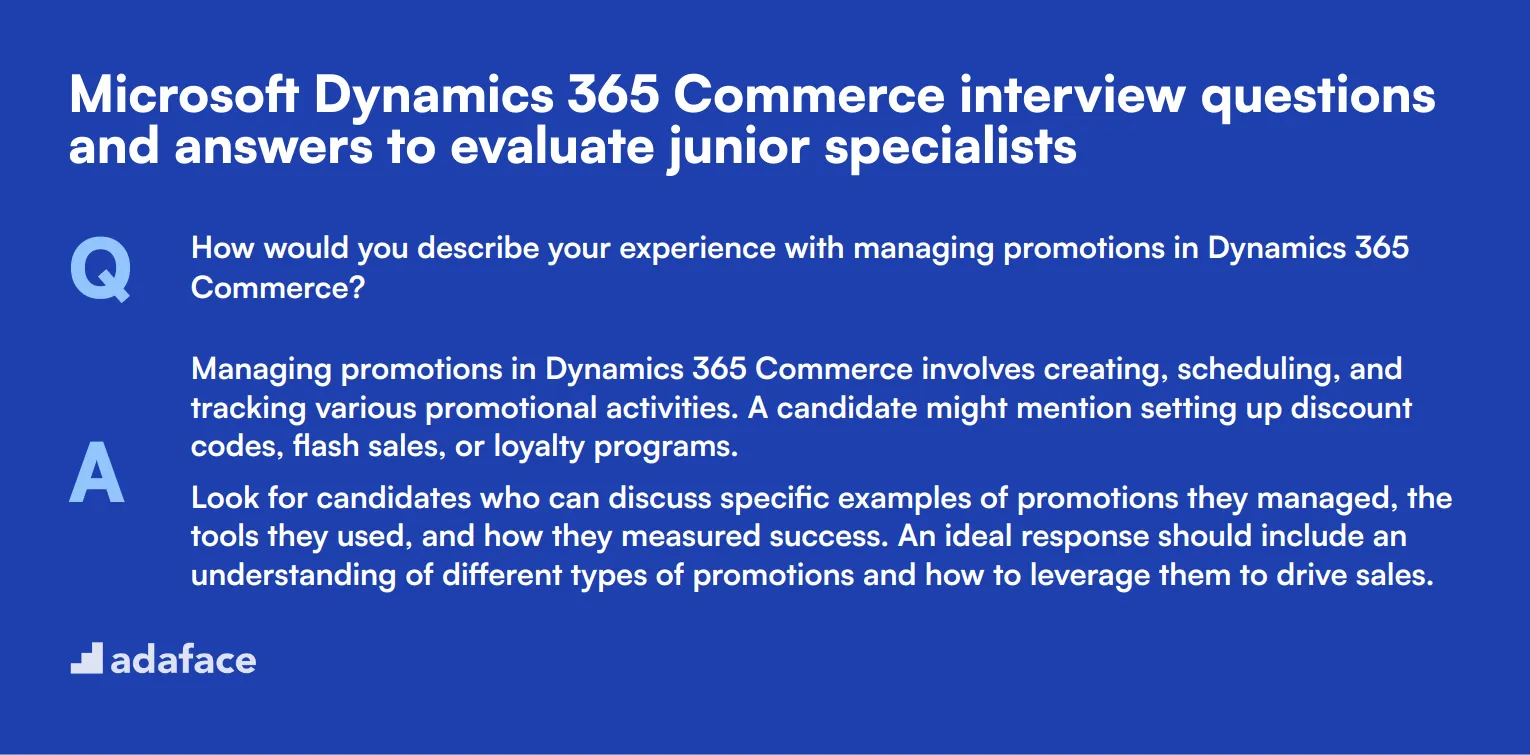
These interview questions are designed to help you evaluate the skills and knowledge of junior specialists in Microsoft Dynamics 365 Commerce. Use this list to ensure your candidates not only grasp the basics but also have practical experience with the platform.
1. How would you describe your experience with managing promotions in Dynamics 365 Commerce?
Managing promotions in Dynamics 365 Commerce involves creating, scheduling, and tracking various promotional activities. A candidate might mention setting up discount codes, flash sales, or loyalty programs.
Look for candidates who can discuss specific examples of promotions they managed, the tools they used, and how they measured success. An ideal response should include an understanding of different types of promotions and how to leverage them to drive sales.
2. Can you explain how Dynamics 365 Commerce handles inventory management?
Dynamics 365 Commerce provides robust inventory management capabilities, allowing users to track inventory levels, manage stock locations, and automate replenishment processes. It integrates seamlessly with other supply chain management tools.
Candidates should be able to explain how they have used these features in past roles. Look for insights into their ability to maintain optimal inventory levels, reduce stockouts, and manage complex supply chains. They may also mention specific modules or features they found useful.
3. What are some strategies you have used to optimize the checkout process in Dynamics 365 Commerce?
Optimizing the checkout process in Dynamics 365 Commerce can involve simplifying the user interface, integrating various payment methods, and ensuring a smooth, secure transaction flow. Candidates might mention A/B testing different checkout layouts or implementing one-click purchase options.
Ideal candidates will explain how they have used data analytics to identify bottlenecks in the checkout process and implemented solutions to enhance user experience. They should also discuss any improvements in conversion rates or customer satisfaction as a result of these optimizations.
4. How do you approach creating and managing customer loyalty programs in Dynamics 365 Commerce?
Creating and managing customer loyalty programs in Dynamics 365 Commerce involves setting up reward points, tracking customer interactions, and providing personalized offers. The platform allows for detailed tracking of customer behavior and preferences.
Candidates should provide examples of loyalty programs they have designed, discussing the goals, execution, and results. Look for their ability to leverage data to personalize offers and increase customer retention. Mentioning specific tools or integrations they used to enhance these programs can be a plus.
5. Can you describe your experience with using Dynamics 365 Commerce for multi-channel retailing?
Dynamics 365 Commerce supports multi-channel retailing by allowing businesses to manage online stores, physical stores, and marketplaces from a single platform. It provides tools for inventory synchronization, consistent pricing, and unified customer experiences across channels.
Candidates should discuss specific multi-channel strategies they have implemented and how they ensured a seamless experience for customers. An ideal response will highlight their ability to coordinate operations across different sales channels and leverage the platform to maximize reach and efficiency.
6. What are some best practices you follow when setting up product attributes in Dynamics 365 Commerce?
Best practices for setting up product attributes in Dynamics 365 Commerce include clearly defining attribute categories, ensuring consistency across products, and using detailed attributes for better searchability and customer filtering. This helps in maintaining organized and easily navigable product catalogs.
Candidates should demonstrate their attention to detail and thorough understanding of product categorization. They might also discuss how they ensure attribute data is kept up-to-date and accurate. Look for examples of how well-organized product attributes have improved customer experience or operational efficiency.
7. How do you manage customer data within Dynamics 365 Commerce to ensure personalized marketing efforts?
Managing customer data in Dynamics 365 Commerce involves collecting and analyzing customer interactions, purchase history, and preferences. This data can then be used to create targeted marketing campaigns and personalized offers.
Candidates should highlight their experience with data segmentation, customer profiling, and targeted marketing. Look for their ability to use insights from customer data to drive marketing strategies and improve engagement. They may also mention specific tools or integrations they used to enhance personalization efforts.
8. What steps do you take to ensure data accuracy and integrity in Dynamics 365 Commerce?
Ensuring data accuracy and integrity in Dynamics 365 Commerce involves regular audits, implementing validation rules, and training staff on proper data entry techniques. Consistent data practices help in maintaining reliable and actionable information.
Candidates should discuss their approach to data management, including any tools or processes they use to monitor and maintain data quality. An ideal response will include examples of how they've addressed data integrity issues in the past and the impact of those improvements on business operations.
12 intermediate Microsoft Dynamics 365 Commerce interview questions and answers to ask mid-tier specialists
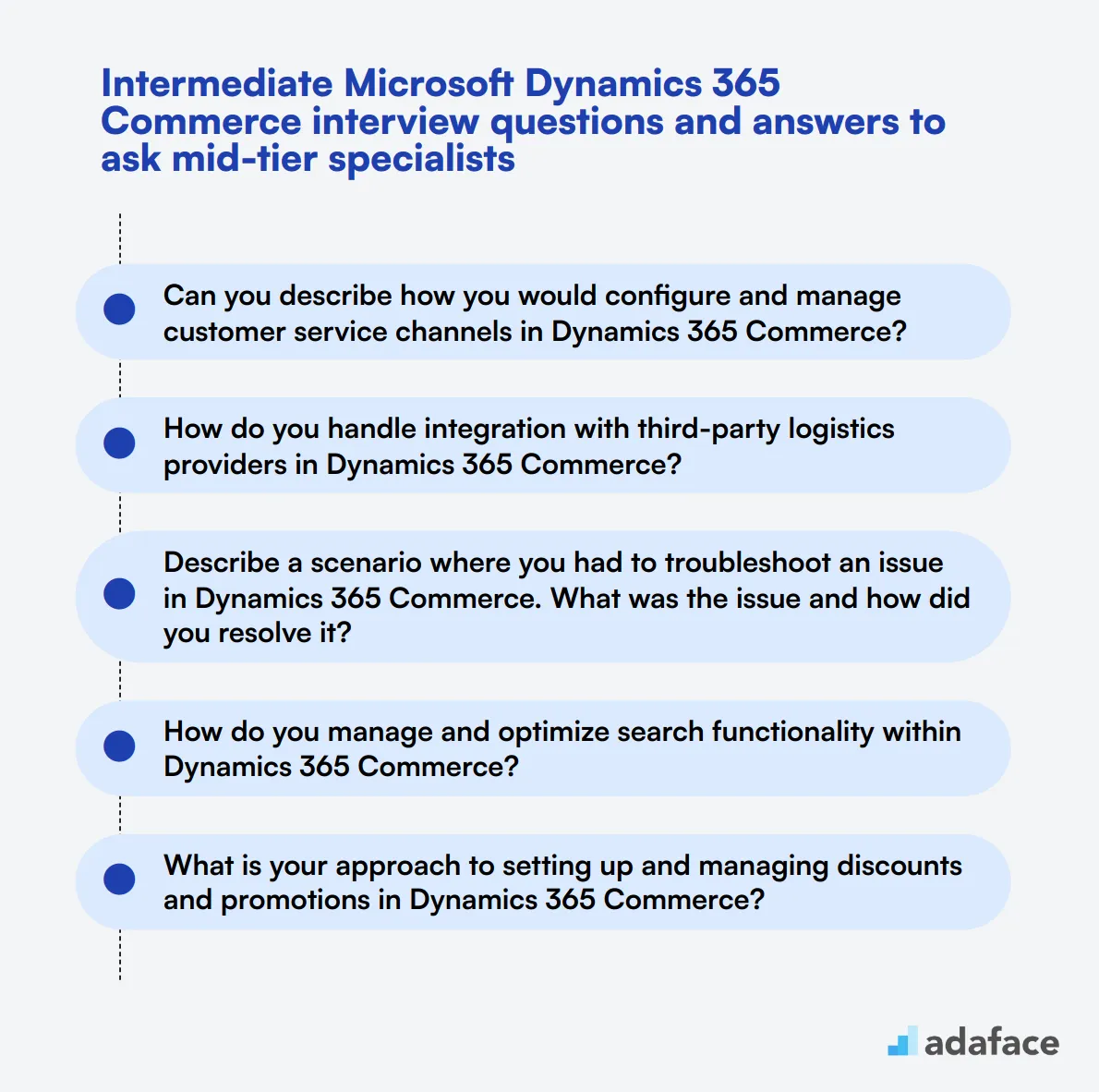
To determine whether your candidates have the practical know-how to handle mid-level tasks in Microsoft Dynamics 365 Commerce, ask them some of these intermediate interview questions. These questions will help you gauge their technical proficiency and problem-solving abilities, ensuring they are equipped to manage complex projects effectively. For more insights on hiring strategies, check out this IT Manager job description.
- Can you describe how you would configure and manage customer service channels in Dynamics 365 Commerce?
- How do you handle integration with third-party logistics providers in Dynamics 365 Commerce?
- Describe a scenario where you had to troubleshoot an issue in Dynamics 365 Commerce. What was the issue and how did you resolve it?
- How do you manage and optimize search functionality within Dynamics 365 Commerce?
- What is your approach to setting up and managing discounts and promotions in Dynamics 365 Commerce?
- Can you explain how you manage user roles and permissions within Dynamics 365 Commerce?
- How do you handle the implementation of new features or updates in an existing Dynamics 365 Commerce environment?
- Describe your experience with A/B testing in Dynamics 365 Commerce. How do you set it up and what metrics do you track?
- How do you approach the localization of a Dynamics 365 Commerce site for different languages and regions?
- Can you discuss your experience with integrating Dynamics 365 Commerce with CRM systems?
- What strategies do you use to ensure high availability and reliability of a Dynamics 365 Commerce solution?
- How do you manage returns and refunds in Dynamics 365 Commerce?
7 advanced Microsoft Dynamics 365 Commerce interview questions and answers to evaluate senior consultants
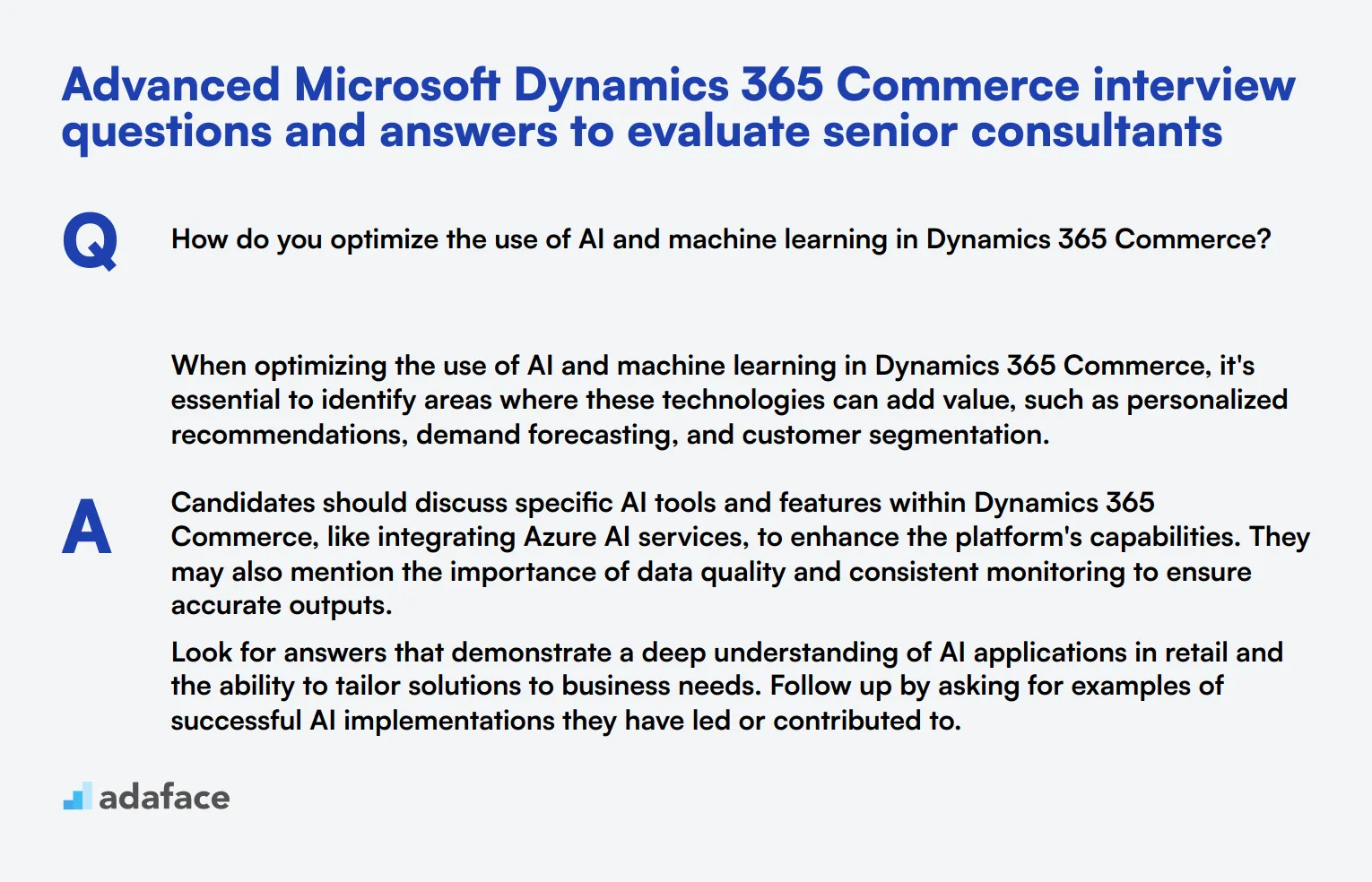
To determine whether your applicants have the advanced skills and experience necessary to tackle complex tasks with Microsoft Dynamics 365 Commerce, ask them some of these senior-level interview questions. This list will help you evaluate their strategic thinking, problem-solving abilities, and practical knowledge, ensuring you find the right fit for your team.
1. How do you optimize the use of AI and machine learning in Dynamics 365 Commerce?
When optimizing the use of AI and machine learning in Dynamics 365 Commerce, it's essential to identify areas where these technologies can add value, such as personalized recommendations, demand forecasting, and customer segmentation.
Candidates should discuss specific AI tools and features within Dynamics 365 Commerce, like integrating Azure AI services, to enhance the platform's capabilities. They may also mention the importance of data quality and consistent monitoring to ensure accurate outputs.
Look for answers that demonstrate a deep understanding of AI applications in retail and the ability to tailor solutions to business needs. Follow up by asking for examples of successful AI implementations they have led or contributed to.
2. Describe your approach to managing large-scale Dynamics 365 Commerce implementations.
Managing large-scale Dynamics 365 Commerce implementations requires thorough planning, stakeholder engagement, and risk management. An ideal approach involves breaking the project into manageable phases, such as discovery, design, development, testing, and deployment.
Candidates should emphasize the importance of clear communication and regular updates with stakeholders. They might also discuss their experience with tools and methodologies like Agile or Scrum to ensure smooth project execution.
Strong responses will showcase the candidate's ability to handle complex projects, manage cross-functional teams, and maintain focus on delivering value. Follow up by asking about specific challenges they faced and how they overcame them.
3. How do you ensure seamless omnichannel experiences in Dynamics 365 Commerce?
Ensuring seamless omnichannel experiences in Dynamics 365 Commerce involves integrating online and offline channels to provide a consistent customer journey. This requires a unified view of customer data, inventory, and order management across all touchpoints.
Candidates should discuss their experience with tools and strategies for achieving omnichannel alignment, such as integrating CRM systems, using real-time data analytics, and implementing flexible fulfillment options like buy online, pick up in-store (BOPIS).
Look for candidates who can articulate a clear vision for omnichannel retailing and demonstrate their ability to execute on that vision. Ask for examples of successful omnichannel projects they have led or contributed to.
4. Can you explain how to leverage Dynamics 365 Commerce for international expansion?
Leveraging Dynamics 365 Commerce for international expansion involves configuring the platform to handle multiple languages, currencies, and tax regulations. This requires a deep understanding of localization options available within Dynamics 365 Commerce.
Candidates should discuss their experience with setting up and managing international stores, including strategies for handling shipping logistics, payment gateways, and compliance with regional laws.
An ideal candidate will demonstrate knowledge of international market dynamics and the ability to tailor solutions to diverse customer bases. Follow up by asking about specific regions they have worked with and any unique challenges they encountered during expansion.
5. How do you use Dynamics 365 Commerce to drive customer engagement and retention?
Driving customer engagement and retention with Dynamics 365 Commerce involves leveraging personalized experiences, loyalty programs, and targeted marketing campaigns. Candidates should be familiar with features like AI-driven recommendations, customer segmentation, and marketing automation.
They may discuss their experience with integrating third-party tools to enhance customer engagement, as well as strategies for analyzing customer data to refine marketing efforts and improve retention rates.
Look for responses that demonstrate a strategic approach to customer engagement and a track record of successful initiatives. Follow up by asking for specific examples of campaigns or programs they have implemented.
6. What strategies do you use to ensure data security and compliance in Dynamics 365 Commerce?
Ensuring data security and compliance in Dynamics 365 Commerce involves implementing robust security measures, such as encryption, access control, and regular security audits. Candidates should be familiar with industry standards and regulations like GDPR, HIPAA, and PCI DSS.
They should discuss their experience with setting up and managing security protocols within Dynamics 365 Commerce, as well as their approach to monitoring and responding to potential security threats.
Strong candidates will demonstrate a proactive approach to security and a deep understanding of compliance requirements. Follow up by asking about specific security incidents they have managed and the lessons learned from those experiences.
7. How do you leverage Dynamics 365 Commerce's analytics capabilities to make data-driven decisions?
Leveraging Dynamics 365 Commerce's analytics capabilities involves using built-in tools and integrations with Power BI to analyze sales data, customer behavior, and inventory levels. Candidates should be familiar with creating custom reports and dashboards to track key performance indicators (KPIs).
They should discuss their approach to using data insights to inform business decisions, such as adjusting inventory levels, optimizing pricing strategies, or targeting marketing efforts more effectively.
Look for candidates who can demonstrate a strong analytical mindset and the ability to translate data insights into actionable business strategies. Follow up by asking for examples of how they have used data to drive improvements in past projects.
10 Microsoft Dynamics 365 Commerce questions related to system configurations
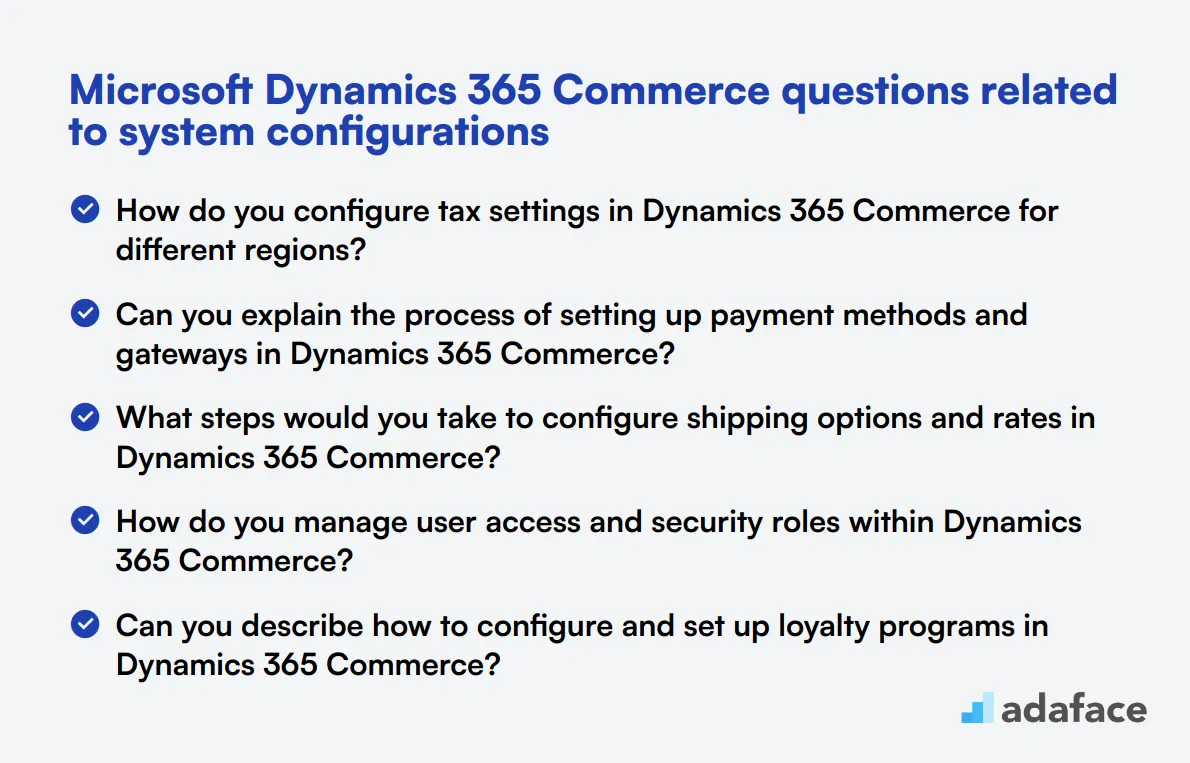
When hiring for positions involving Microsoft Dynamics 365 Commerce, it's crucial to assess candidates' technical understanding and practical experience. Use these system configuration questions to determine whether applicants have the right skills to effectively manage and configure the platform for optimal performance and user satisfaction. For more detailed insights, refer to this software engineer job description.
- How do you configure tax settings in Dynamics 365 Commerce for different regions?
- Can you explain the process of setting up payment methods and gateways in Dynamics 365 Commerce?
- What steps would you take to configure shipping options and rates in Dynamics 365 Commerce?
- How do you manage user access and security roles within Dynamics 365 Commerce?
- Can you describe how to configure and set up loyalty programs in Dynamics 365 Commerce?
- What is your approach to configuring store-specific settings in Dynamics 365 Commerce?
- How would you set up and manage the returns process in Dynamics 365 Commerce?
- Can you explain the steps to configure product variants and attributes in Dynamics 365 Commerce?
- How do you set up and manage customer groups within Dynamics 365 Commerce?
- What is your experience with configuring Dynamics 365 Commerce to support multiple currencies?
12 Microsoft Dynamics 365 Commerce questions related to integration processes
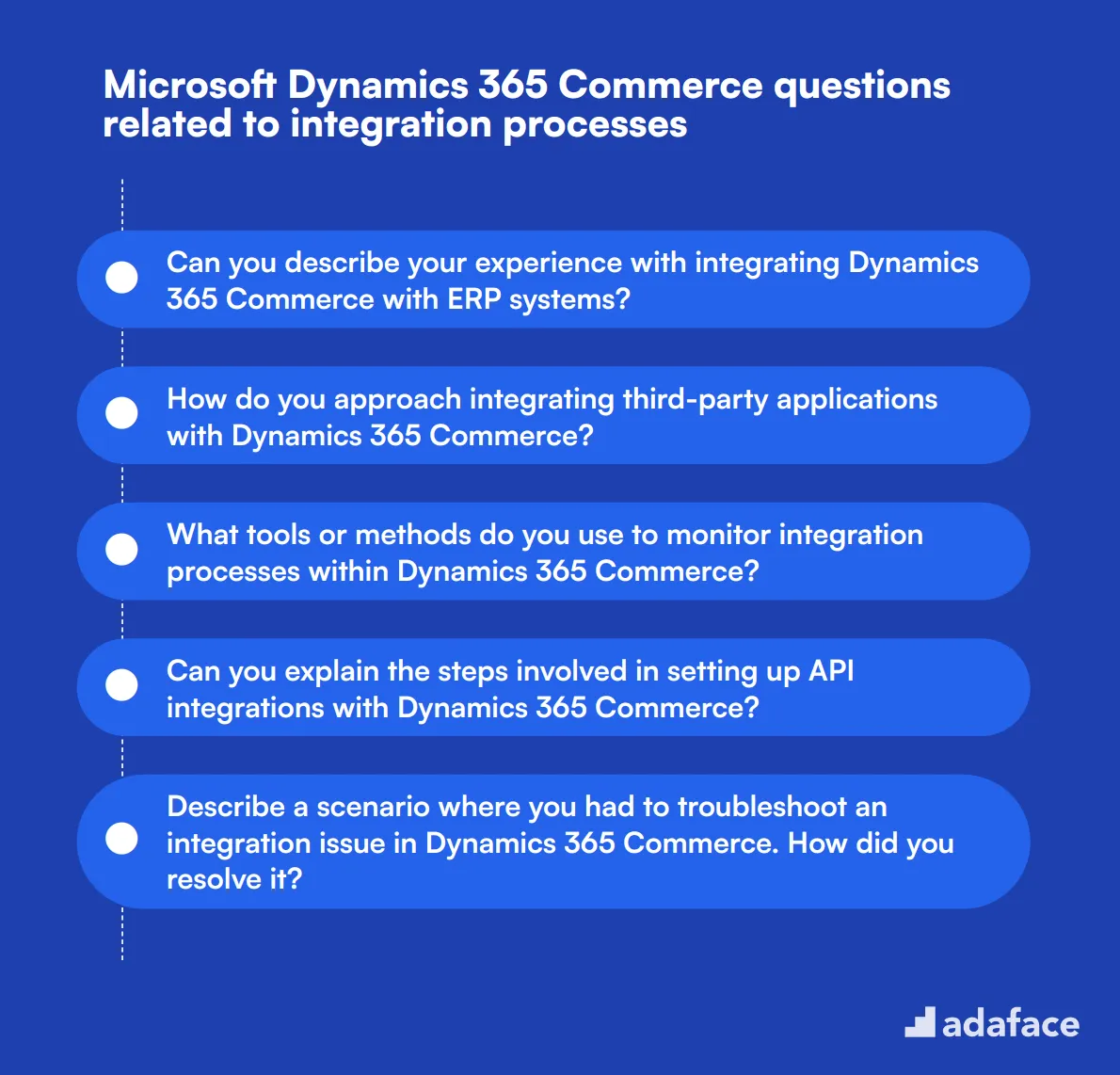
To ensure your candidates have the expertise needed for seamless and efficient integration processes with Microsoft Dynamics 365 Commerce, consider asking them these targeted questions. These questions will help you evaluate their technical skills and problem-solving abilities, ensuring they can handle the complexity of integration tasks effectively.
- Can you describe your experience with integrating Dynamics 365 Commerce with ERP systems?
- How do you approach integrating third-party applications with Dynamics 365 Commerce?
- What tools or methods do you use to monitor integration processes within Dynamics 365 Commerce?
- Can you explain the steps involved in setting up API integrations with Dynamics 365 Commerce?
- Describe a scenario where you had to troubleshoot an integration issue in Dynamics 365 Commerce. How did you resolve it?
- How do you ensure data consistency and accuracy during the integration process with Dynamics 365 Commerce?
- What are some best practices you follow when integrating Dynamics 365 Commerce with external payment systems?
- Can you explain the role of middleware in integrating Dynamics 365 Commerce with other systems?
- How do you handle real-time data synchronization between Dynamics 365 Commerce and other platforms?
- What experience do you have with integrating Dynamics 365 Commerce with Marketing Automation tools?
- How do you manage and secure data during the integration process in Dynamics 365 Commerce?
- Can you discuss your approach to integrating Dynamics 365 Commerce with customer service management systems?
Which Microsoft Dynamics 365 Commerce skills should you evaluate during the interview phase?
While it's challenging to evaluate every aspect of a candidate's expertise in a single interview, focusing on core Microsoft Dynamics 365 Commerce skills is crucial. These key competencies form the foundation for success in this role.
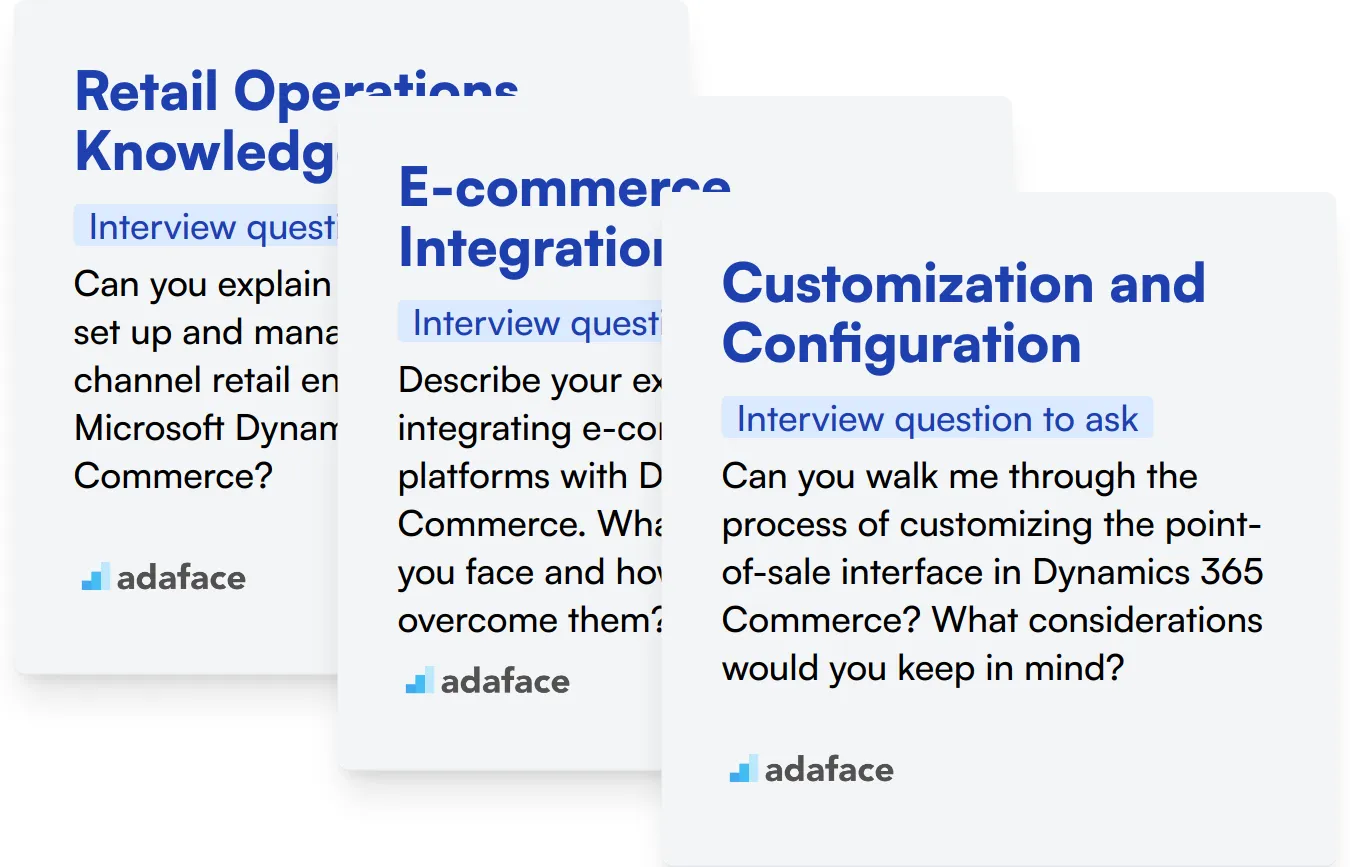
Retail Operations Knowledge
Understanding retail operations is fundamental for Microsoft Dynamics 365 Commerce specialists. This knowledge enables them to configure and customize the system to meet specific retail business needs.
To assess this skill, consider asking a targeted question about retail processes:
Can you explain how you would set up and manage a multi-channel retail environment using Microsoft Dynamics 365 Commerce?
Look for answers that demonstrate familiarity with omnichannel retailing, inventory management across channels, and the ability to integrate online and offline sales processes. A strong candidate should also mention features like centralized order management and unified customer profiles.
E-commerce Integration
Proficiency in e-commerce integration is vital for leveraging the full potential of Dynamics 365 Commerce. This skill allows for seamless online store creation and management within the Dynamics ecosystem.
To evaluate this competency, you might ask:
Describe your experience in integrating e-commerce platforms with Dynamics 365 Commerce. What challenges did you face and how did you overcome them?
Listen for responses that highlight experience with e-commerce platform integration, understanding of API connections, and problem-solving skills. Candidates should mention specific challenges like data synchronization or performance optimization and their solutions.
Customization and Configuration
The ability to customize and configure Dynamics 365 Commerce is crucial for tailoring the solution to specific business requirements. This skill ensures that the system aligns perfectly with a company's unique processes and needs.
To initially screen for this skill, you might consider using a Microsoft Dynamics 365 Commerce functional consultant test. This can help gauge a candidate's foundational knowledge before the interview.
During the interview, you can further assess this skill with a specific question:
Can you walk me through the process of customizing the point-of-sale interface in Dynamics 365 Commerce? What considerations would you keep in mind?
Look for answers that demonstrate knowledge of the customization tools within Dynamics 365 Commerce, understanding of user experience design, and awareness of performance implications. Strong candidates should also mention testing procedures and best practices for maintaining customizations.
3 Tips for Effectively Using Microsoft Dynamics 365 Commerce Interview Questions
As you prepare to implement what you've learned about Microsoft Dynamics 365 Commerce interview questions, here are three tips to enhance your interview process.
1. Incorporate Skills Tests Prior to Interviews
Using skills tests before interviews helps to objectively evaluate candidates and reduces the chances of bias in the selection process. For roles related to Microsoft Dynamics 365 Commerce, consider utilizing the Microsoft Dynamics 365 Commerce Functional Consultant Test to assess relevant competencies.
These tests allow you to gauge specific skills such as system configurations and integration processes, ensuring candidates possess the necessary expertise. By integrating these assessments early in your hiring process, you can streamline your interview by focusing on candidates who show real potential.
This approach not only saves time but also increases the likelihood of hiring a qualified candidate, setting the tone for a productive interview.
2. Compile Targeted Interview Questions
In interviews, time is often limited, making it essential to choose the right questions that delve into key competencies. Focus on asking a select few targeted questions that will effectively evaluate candidates on important aspects related to Microsoft Dynamics 365 Commerce.
Consider integrating questions related to soft skills, such as communication and teamwork, along with specific technical queries. For example, you might want to explore questions related to project management or business analysis as they are also relevant to the role.
By being strategic in your questioning, you can maximize the success of your evaluations and gain a clearer understanding of each candidate's fit for the position.
3. Ask Thoughtful Follow-Up Questions
Simply asking initial interview questions won't suffice; following up is key to uncovering deeper insights. Candidates might sometimes provide surface-level answers to impress, so probing with follow-up questions is essential for assessing their true depth of knowledge.
For instance, if you ask a candidate about their experience with system integrations in Microsoft Dynamics 365 Commerce, a good follow-up might be, 'Can you describe a specific challenge you faced during integration and how you overcame it?' This question not only checks their experience but also shows how they handle real-world problems.
Use Microsoft Dynamics 365 Commerce interview questions and skills tests to hire talented consultants
If you are looking to hire someone with Microsoft Dynamics 365 Commerce skills, you need to ensure they possess these skills accurately. The best way to do this is by using skill tests such as our Microsoft Dynamics 365 Commerce Functional Consultant Test or Microsoft Dynamics 365 Finance Functional Consultant Test.
Once you utilize these tests, you can shortlist the best applicants and call them for interviews. To get started, sign up here or explore our test library for more options.
Microsoft Dynamics 365 Commerce Functional Consultant Test
Download Microsoft Dynamics 365 Commerce interview questions template in multiple formats
Microsoft Dynamics 365 Commerce Interview Questions FAQs
Focus on assessing the candidate's knowledge in system configurations, integration processes, and their proficiency in handling various levels of Dynamics 365 Commerce tasks from basic to advanced.
Use a mix of basic, intermediate, and advanced questions to gauge the depth of knowledge and practical experience of the candidate. Tailor these questions according to the role you're hiring for.
Including both types of questions helps in assessing the candidate's technical expertise as well as their ability to communicate effectively, work in a team, and solve problems creatively.
Ask specific questions about their familiarity with configuration tools, their process for configuring systems, and any past experiences they have had with complex configurations.
Inquire about their experience with APIs, data integration tools, and how they manage integration projects. Ask about any challenges they have faced and how they resolved them.
Absolutely! Feel free to tailor the questions based on the specific skills and experience required for the role you are hiring for.

40 min skill tests.
No trick questions.
Accurate shortlisting.
We make it easy for you to find the best candidates in your pipeline with a 40 min skills test.
Try for freeRelated posts
Free resources




